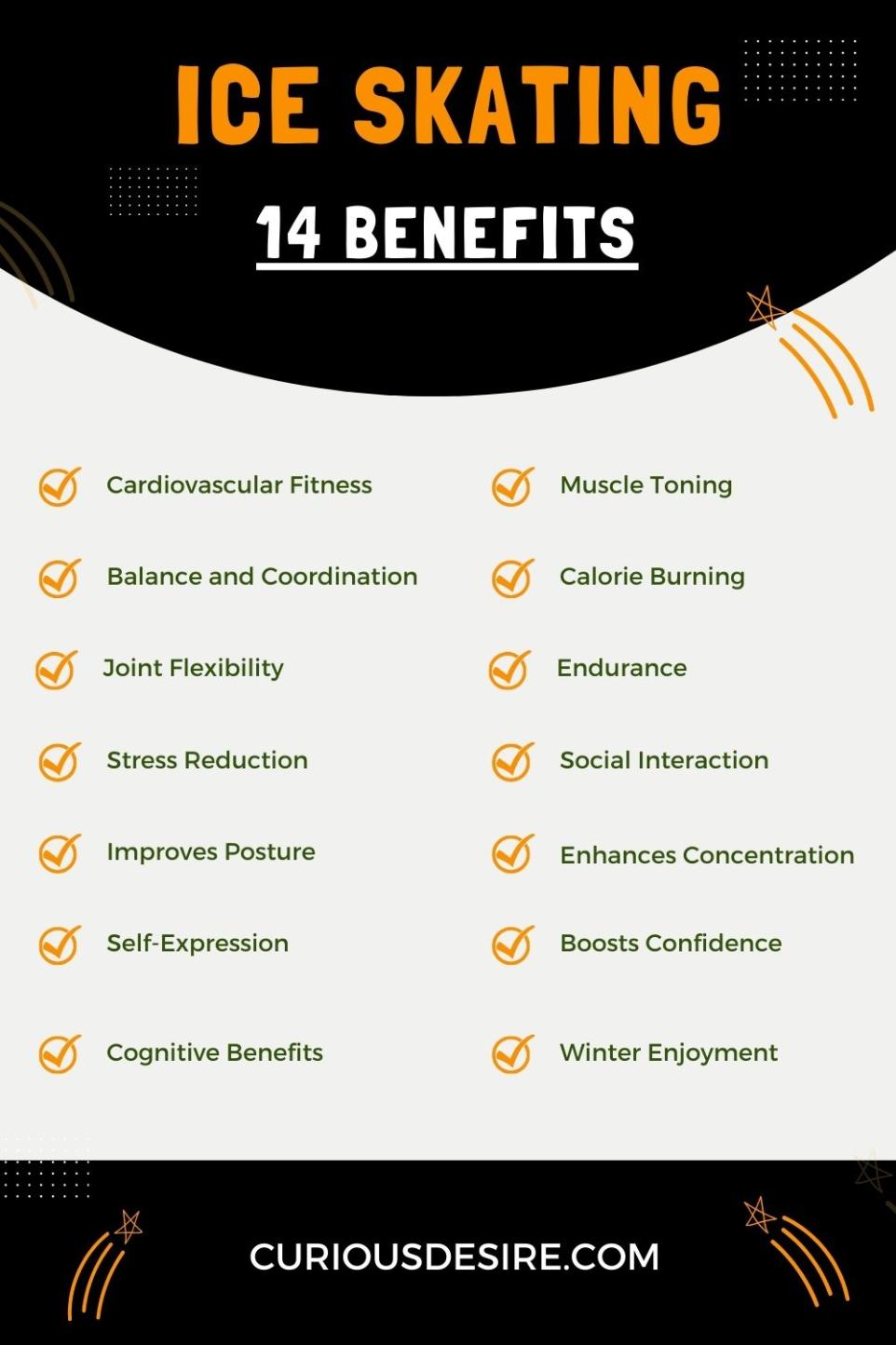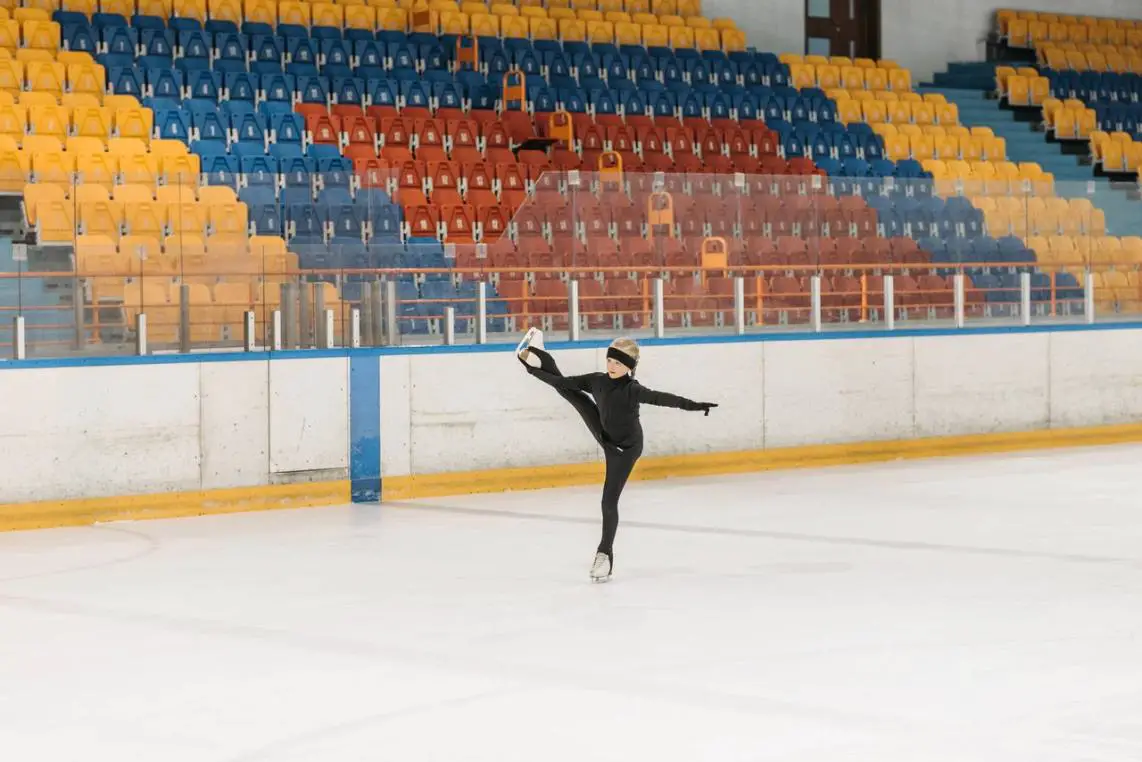Step onto the ice, and you’ll find a world of benefits waiting for you.
Ice skating isn’t just a winter pastime—it comes with physical and mental perks.
From the joy of gliding to the thrill of exercise, every glide brings unique advantages.
In this article, we’ll share some of those benefits with you so that the next time you hit the ice, you can enjoy a wholesome feeling, knowing there’s more to it than just amusement.
Here are the Top 5 Benefits Of Ice Skating:
- Calorie Burning
- Endurance
- Stress Reduction
- Enhances Concentration
- Self-Expression
[toc]

Benefit 1: Cardiovascular Fitness
Ice skating is not just an amusing activity; it provides long-term health benefits due to its very engaging nature.
According to the Kroc Center, ice skating is a great form of exercise that helps improve cardiovascular fitness, balance, coordination, and flexibility.
It contributes to cardiovascular health by increasing the heart rate, promoting better blood circulation, and strengthening the muscles.
This sustained aerobic exercise helps improve overall cardiovascular health, reducing the risk of heart-related issues over time.
Regular skating sessions can enhance endurance and stamina, making everyday activities feel less tiring.
Benefit 2: Muscle Toning
Other than cardiovascular health benefits, ice skating involves the use of various muscle groups, providing an intensive full-body workout.
As mentioned by Athlete’s Choice Massage, skating is a full-body workout that engages several muscle groups, including the legs, core, arms, and back.
The continuous pushing and gliding motions particularly engage the quadriceps, hamstrings, and calf muscles.
Additionally, maintaining balance on the ice requires activation of the core muscles, contributing to overall muscle toning.
Skating also works the muscles in the arms as you swing them for balance, creating a comprehensive muscular workout that can lead to increased strength and tone over time.
Benefit 3: Balance and Coordination
As mentioned in the first benefit, related to cardiovascular benefits, improving coordination is indeed one of the key advantages of ice skating, as supported by a claim from Rainbow Skateland.
As you glide over the ice, you constantly make adjustments to maintain equilibrium, thereby enhancing your sense of balance.
The rhythmic and coordinated movements required for skating also contribute to improved overall coordination.
These benefits extend beyond the rink, positively impacting daily activities that rely on balance and coordination, such as walking, climbing stairs, or even carrying groceries.
Benefit 4: Calorie Burning
Benefit 5: Joint Flexibility
The smooth gliding motion of ice skating promotes joint flexibility by encouraging a wide range of motion.
As you propel yourself forward and execute turns, your joints, including the ankles and knees, go through a controlled and low-impact range of movements.
This reduces the risk of joint injuries while improving flexibility and range of motion (source), making daily mobility more comfortable and reducing the risk of stiffness or discomfort.
Benefit 6: Endurance
Ice skating is a sustained physical activity that challenges your cardiovascular system and muscles, thereby improving overall endurance.
Regularly engaging in skating sessions helps your body adapt to prolonged physical effort, allowing you to endure activities for more extended periods without feeling overly fatigued.
Improved endurance not only enhances your ability to enjoy skating but also translates into increased stamina for other physical activities in your daily life.
Benefit 7: Stress Reduction
The rhythmic and enjoyable nature of skating serves as a beneficial outlet for stress and tension.
As supported by Dr. Brian Cole, when you glide across the ice, enjoying a few minutes of skating, your body releases hormones that uplift your mood, effectively reducing stress and anxiety. Engaging in long-term ice skating not only enhances your mood but also provides a healthy and enjoyable hobby to look forward to, helping to alleviate feelings of sadness.
Therefore, whether you’re gracefully gliding across the ice alone or sharing the experience with friends, the combination of exercise and a positive environment contributes to an overall sense of well-being.
This, in turn, helps alleviate stress and promotes a state of mental relaxation.
Embracing the joyful and rhythmic motions of ice skating becomes more than just a physical activity—it transforms into a holistic approach to nurturing mental health and fostering a positive outlook on life.
Benefit 8: Social Interaction
Ice skating is often a social activity, providing opportunities for interaction with friends, family, or fellow skaters. Sharing the ice with others creates a supportive and enjoyable atmosphere.
Whether you’re sharing laughs while gliding around the rink or cheering each other on in friendly races, the social side of skating brings an added layer of enjoyment to the experience.
This social interaction not only adds to the fun but also creates a sense of community, making the activity more engaging and fulfilling.
Benefit 9: Improves Posture
Maintaining proper posture is essential in ice skating, as it directly affects balance and stability on the ice. Regular practice of skating encourages good posture habits, helping to align the spine and shoulders.
As you focus on staying upright and centered while gliding, you inadvertently train your body to adopt a more upright and aligned posture.
This improvement in posture can extend to your daily life, promoting spinal health and reducing the likelihood of developing posture-related issues.
Benefit 10: Enhances Concentration
Ice skating requires a level of focus and concentration, as you navigate the ice, anticipate movements, and adjust your balance.
The need to stay attentive to your surroundings and coordinate your body’s movements contributes to improved concentration and mental sharpness.
This enhanced cognitive engagement not only benefits your performance on the ice but can also carry over to other aspects of your life, promoting better attention and focus in daily activities and tasks.
Benefit 11: Self-Expression
Ice skating allows for a unique form of self-expression, particularly in disciplines like artistic and figure skating.
As U-High Midway aptly puts it, skating isn’t always immediately rewarding, but it teaches valuable lessons in self-discipline, self-expression, and pain tolerance all at once.
When you choreograph routines, and express emotions through graceful movements on the ice, you find a special outlet for personal expression.
This artistic aspect of ice skating adds a fulfilling and personal dimension to the activity, making it especially rewarding for those who enjoy combining physicality with creative expression.
Benefit 12: Boosts Confidence
Learning and mastering new skating skills can significantly boost self-confidence. As individuals progress in their skating abilities, they gain a sense of accomplishment and mastery over challenges.
This same idea is supported by the views from Ice Rink at Westfield London, if you go skating regularly, you’ll quickly start to see an improvement in your abilities it can also help to boost your self-confidence.
Overcoming initial fears, perfecting techniques, and achieving personal milestones on the ice contribute to a positive self-image and increased self-assurance.
This boost in confidence can extend beyond the rink, positively influencing various aspects of life by encouraging a can-do attitude and a willingness to take on new
Benefit 13: Cognitive Benefits
Ice skating involves decision-making, spatial awareness, and quick responses to changes in the environment.
These cognitive demands stimulate brain activity and contribute to cognitive development.
The need to process information quickly, plan movements, and react to the ever-changing conditions on the ice enhances cognitive functions such as problem-solving, coordination, and spatial reasoning.
Engaging in activities that challenge the mind while being physically active is a valuable way to promote holistic well-being.
Benefit 14: Winter Enjoyment
Ice skating is often associated with the winter season, providing a unique and enjoyable way to embrace the colder months.
Whether it’s the joy of gliding on a frozen pond, the festive atmosphere of a seasonal ice rink, or the simple pleasure of being outdoors in a winter wonderland, ice skating adds a positive and recreational element to the winter experience.
This seasonal enjoyment can contribute to a more active and fulfilling lifestyle, encouraging individuals to embrace the unique opportunities that each season brings.

